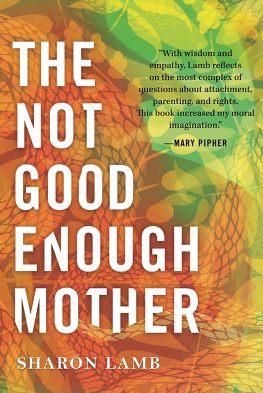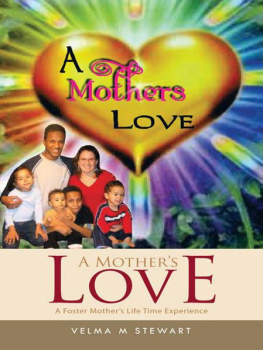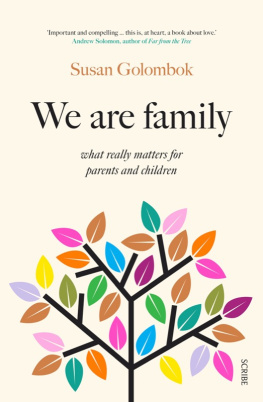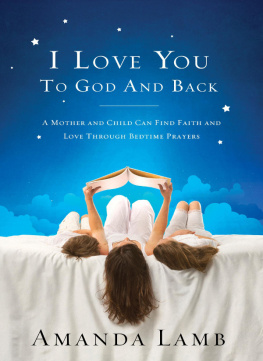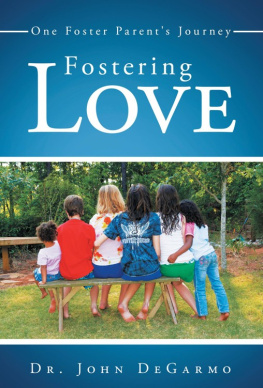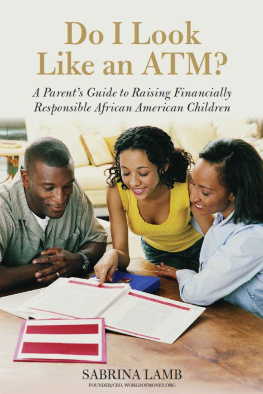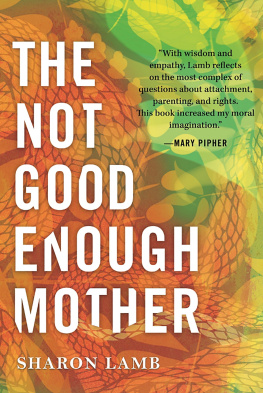Table of Contents
Pagebreaks of the print version
Guide
For Paul
For Willy
For Julian
And for all mothers and othermothers.
We want to give our children the world.
We end up giving them ourselves and hope that thats good enough.
PROLOGUE
MAMA, MAMA, MAMA, MAMA, MAMA, MAMA. Her crying filled the hot car. It had been sitting in the Vermont summer sun for an hour before I took off down the country road, kicking up a fog of dust behind me. Strapped in a car seat between her older sister and older brother, Krystle wailed for the mother we were driving away from inside the battered white house that I could still see in the rearview mirror. A house with no electricity, no running water, no toys, no place to play. I didnt really believe it was their mothers house. I was pretty sure it was a place she had borrowed for what had been the all-important home observation.
Krystles crying grew in intensity. I checked the mirror again and saw that her towheaded older sister and brother were trying not to cry. I sped up, but then the wails started. Although five and seven years old, the siblings tapped into a very early memory of what it meant to howl like a baby, with a full, open-throated cry. Not the healthy cry that demands what it wants when it wants it, but the bereft moan of helplessness. Hopelessness. Mama, Mama, Mama. Three children in agony, finding their rhythm and maybe some comfort in their chorus.
Well be at your daddys soon, I said. I know. I know, you miss your mommy. I couldnt offer comfort by telling the children that theyd see their mother again. I didnt know that they would. After this visit, and for a variety of other reasons, I was leaning away from recommending that they be returned to her.
I take children away from their parents. Sometimes permanently.
Perhaps Im being too dramatic when I assume such full responsibility. Yet when I complete an evaluation and write a report recommending the termination of parental rights, supporting a TPR, the judge frequently takes my advice. Both the judicial and social service systems crank into gear when a child has been abused or neglected, and there are many individuals who monitor parents progress and failures. But in the end, I retain the feelingand maybe thats whats important here, my feelingthat the responsibility is all on me. And I feel heartless.
There are others. There are social workers from the Department of Children and Families, DCF in Vermont, who document the failure of parents to comply with requests to make their home safer or attend therapy or give up drugs. I use their reports. Lawyers representing the state, the parents, and even the child give me perspectives from all sides and later, in court, make arguments ranging from cogent to ridiculous about my evaluation and written report. Other witnesses in court bring in facts on what they have observed: the domestic argument overheard through the walls or a toddler unsupervised playing in the garbage out back behind her house or the child found alone at home with nothing in the cabinets to eat. Their contributions are very important, but the expert is crucial. When I bring in the purportedly scientific facts and theories from the field of psychology and child development, basic stuff I teach my students who are training to be counselors or psychologists, I draw from the empirical literature. I explain attachment categorizations and how these help us to understand this particular little girls behavior or that particular boys relationship with his mother. I give my opinion to judges who lean forward and show respect. So maybe I am to blame, or more accurately, responsible for the outcome.
Whats there is there, though, sometimes leaving little to interpretation. I try to report on whats there between a mother and a child, between the parents I evaluate and their children. I do this primarily through observations. But I use other pieces of evidence as well, before making my recommendations. When I perform an evaluation, I read through a pile of previously written reports, including ones by other psychologists. There can be many reports before mine. Sometimes a different psychologist provides an evaluation, one to determine the mental health of each parent, another to evaluate the developmental trauma of a child, another, typically from a school psychologist, to provide the academic, social, and psychological work-up. There are also DCF case plans and case dispositions, formal reports that monitor progress. There are documents that show the merit of removing a child via a CHINS, a Child in Need of Services order. There are copious handwritten notes of visit supervisors. There are social worker affidavits, which are long lists of purported facts written in such simple nondescriptive language that they beg to be prioritized as truth over the complex narratives in case plans. There are police affidavits. The facts are formally dressed with times and dates as if to say that numbers remembered and inserted are truer than the noting of a comforting hand on the childs shoulder or the gaze of the child towards his mother. They go like this: Jane Doe was arrested at 10:38 p.m. on August 4, 2001, for attempting to rob a 7-Eleven with a .44 Magnum revolver having left the Lapp Center at 5:45 p.m. taking the #33 bus. There are also written documents of phone conversations with therapists, physicians, pediatricians, teachers, superintendents, family interventionists, substance abuse counselors, probation officers, parenting program teachers, AA sponsors, coworkers, neighbors, and family members. There are personality tests that I have given, scored, and interpreted, including the controversial Rorschach, the ink-blot test, which I have come to rely on to tell me about things I cant determine from the 567 True/False items pushed and shaped into diagnoses in the commonly used personality test, the MMPI-2.
There are also notes from interviews. I play with children in the sandbox in my office as part of the child interview, noting the child who comes into my office fascinated by the wealth of toys, as well as the child who finds nothing suitable to play with: Everythings broken here. In interviews with parents, I take their histories, gaining their trust, momentarily empathizing with their mostly unfortunate lives, damaging relationships, and generational problems that go so far back as to make me feel that there was never any hope for this family.
Observations, though, are key. I enter the houses of parents, both foster parents and biological parents, and sit in a corner taking notes. Dont mind me, I say. The adults are gracious. They offer me coffee or tea and sometimes even dinner. They are wary and welcoming. Ive heard their stories earlier in my office and have kind words for them, and so we have forged some kind of tentative bond. I am a kind person, someone recently told me, after I had said to this person that I was often taken as abrupt and irritable. I may not be kind, but I am definitely kindest in my therapy office, where I become wrapped up in the mothers childhoods and histories of mistreatment. Sitting across from me, they are children again, who want to be heard and have a mother mirror their worth. When they are no longer in my office, when I go to their homes, where they must be parents and judged, the bond that began in my office dissolves. It is my job then and there to watch the way the mothers behave with their children, the way they try to act natural in an unnatural context and attempt to perform a version of good enough mothering for me.

